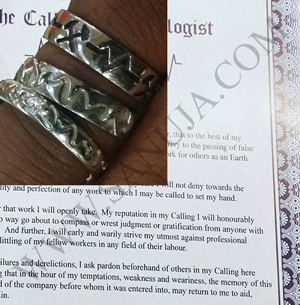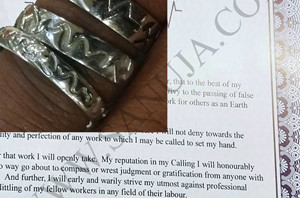It is March already and graduating students from Engineering and Geoscience programs in several provinces across Canada are excited to receive their professional certificates and the infamous rings. Future Engineers get their Iron Rings and the future Geologists and Geophysicists get their Earth Rings1.
To some people receiving the certificate and the ring represents just another stage in their life. To others, it represents absolutely nothing. In extreme cases, students and professionals criticize this practice stating there is no reason to have a professional regulatory body. This is how the meaningfulness of having a ring ceremony can be lost in translation. Yes of course Canada is a free country and everyone is entitled to their own opinions. However, as a matter of principle, I believe these professional qualification rings are not pieces of jewelry. The certificates are certainly not just meaningless papers you add to your pile of certificates.

The Majority of those who oppose regulations are in the geoscience sector. There are two popular arguments against regulatory bodies circulating in the opposition camp. The first argument is that unlike engineers, geoscientists do not take critical enough decisions to be regulated. Respectfully, I completely disagree with this statement because there are numerous engineering failures caused by the lack of geological input such as hydroelectric dam failures due to misinterpretation or rocks and soils. Geoscientists are as important as engineers but unlike engineers, it seems we ourselves devalue our own profession.
The second argument is that geoscience certifications such as Geoscientist in Training (GIT) or Professional Geoscientist (P. Geo) are not widely recognized. This problem can also be fixed though regulatory bodies by enforcing rules and regulations to govern who can be qualified to work in the industry. The biggest problem in acceptance of geoscience professional certifications is that our own Geologists and Geophysicists insist on not recognizing them. I think this mentality has to change to protect our young professionals and future generations. It is disrespectful that some of the professional geoscientist who worked in the industry and research for decades wants to strike down policies that would improve acceptance of GIT and P. Geo certifications. It is a one thing if you personally do not want to apply for it; it is entirely different when you try to make a propaganda movement out of it. Companies should give priority for individuals with professional certifications over others. The hiring and career advancement practices should be overhauled to recognize and provide more bearing to professional certifications.
Finally if I have not convinced you of the importance of professional regulatory bodies and professional certificates, think about the general public. If you look from a general public’s perspective, ask yourself, if you are not proud about your achievement as a professional, then why should others care about what you do? Why should a company hire you if you have no respect for professional traditions? Would you go to a doctor who refused to respect the Hippocratic Oath? In order to receive respect from others, you should respect yourself first. If you are unable to understand and appreciate the values of these traditional professional organizations, maybe you should not be a professional scientist at all.
Disclaimer:
I am a new graduate (2016) with B.Sc. in Petroleum Geology. I am not an expert of anything. However, I have been told repeatedly by veteran Geologists and Geophysicists why certifications such as Geoscientist in Training (GIT) or Professional Geoscientist (P. Geo) are “useless” and “meaning less”. Often GIT and P. Geo certifications have been described as “what’s the point” and “it’s just a ring with a paper”. I wrote this article not to disrespect educated, intelligent and experienced geoscientists, but to encourage positive optimistic discussion on why it is important to recognize certifications and professional regulatory bodies.
Footnotes:
1. Engineering graduates across Canada receives Iron Rings, but not all Geoscience graduates receive Earth Rings. Some Canadian provinces do not have an Earth Ring ceremony.
2. Association of Professional Engineers and Geoscientists of Alberta (APEGA)
3. Engineering and Geoscience Professions Act Alberta
